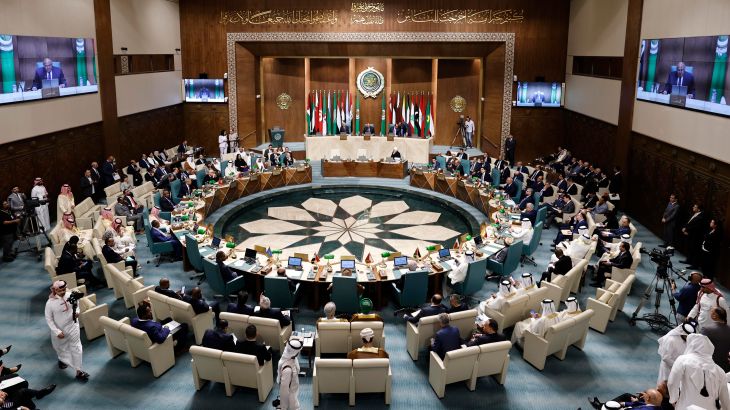Arab League brings Syria back into its fold after 12 years
Ties with Damascus are being normalised, as the bloc hopes for an ‘Arab-led political path’ to solve the Syrian crisis.

Foreign ministers from Arab League member states have agreed to reinstate Syria’s membership after its suspension more than 10 years ago, according to Iraqi state media.
The ministers voted for Syria’s return into the fold at the Arab League’s headquarters in Cairo on Sunday.
Keep reading
list of 3 itemsSyria and Iran leaders sign long-term oil, trade agreements
US says it will not normalise relations with Syria’s Assad
The decision was made in advance of the Arab League Summit in Saudi Arabia on May 19 and amid a flurry of regional normalisation of ties with Damascus in recent weeks.
Syria’s Arab League membership was revoked after President Bashar al-Assad ordered a crackdown on protesters in March 2011 that spiralled the country into a civil war that has since killed nearly half a million people and displaced another 23 million.
As al-Assad solidified his control of Syrian territory, Arab states have been looking to normalise ties, working towards an “Arab-led political path” in solving the crisis, Jordan’s top diplomat said, according to The Associated Press news agency.
The vote took place following a meeting of top regional diplomats from Egypt, Iraq, Saudi Arabia, and Syria in Jordan last week, when they dubbed the process of bringing Damascus back into the Arab fold the “Jordanian Initiative”.
Arab League Secretary-General Ahmed Aboul Gheit said on Sunday that al-Assad can attend the Arab League summit later this month “if he wishes to”.
Responding to a question over whether al-Assad could participate at the summit in Saudi Arabia, Aboul Gheit told a news conference in Cairo: “If he wishes, because Syria, starting from this evening, is a full member of the Arab League, and from tomorrow morning they have the right to occupy any seat.”
“When the invitation is sent by the hosting country, the Kingdom of Saudi Arabia, and if he wishes to participate, he will participate,” he said.
Syria called on Sunday for Arab states to show “mutual respect”, after the Arab League voted to readmit it.
Arab states should pursue “an effective approach based on mutual respect”, the Syrian foreign ministry said in a statement that also stressed the “importance of joint work and dialogue to undertake the challenges facing Arab countries”.
The restoration of ties with Damascus quickened pace following the deadly February 6 earthquake in Turkey and Syria, and the Chinese-brokered re-establishment of ties between Saudi Arabia and Iran, which had backed opposing sides in the Syrian conflict.
Opposition groups have criticised the ties being normalised with Damascus, but the Arab bloc said it was the way forward.
“We respect all opinions on this issue. We understand what the opposition has been saying and we do appreciate that they are in a difficult position,” Assistant Secretary-General of the Arab League Hossam Zaki told Al Jazeera.
“The understanding that has been growing for the past several months, especially after the catastrophe of the earthquake, is that there is no clear international attention that is supposed to be driving for a solution in Syria,” he said.
“The Syrian crisis has been spilling over very negative effects on the neighbouring countries. The neighbouring countries and the region especially the Arab countries feel that this situation needs to be resolved. This is why we reached this point,” Zaki added.
While Saudi Arabia had long resisted normalising relations with al-Assad, Saudi Foreign Minister Prince Faisal bin Farhan Al Saud visited Damascus last month for the first time in more than a decade, and the two countries are also restoring embassies and flights between them.
Iran’s President Ebrahim Raisi also visited Damascus last week, signing long-term trade and oil agreements.
Jordan, Kuwait and Qatar had opposed al-Assad’s presence at the Arab League summit, saying an invitation before Damascus agrees to negotiate a peace plan would be premature.
Meanwhile, the United States has said it will not change its policy towards the Syrian government, deeming it a “rogue” state, and urging Arab states to get something in return for engaging with al-Assad.